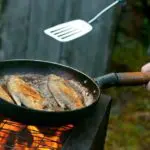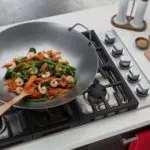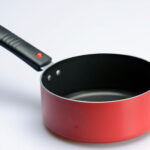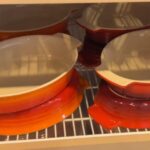Non Stick vs Cast Iron Pan: Which one to Choose?
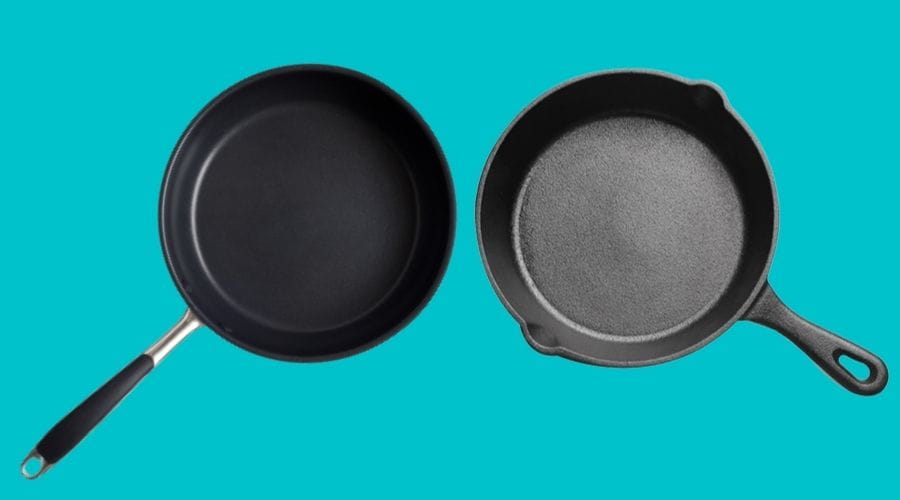
In the world of pans and pots, after stainless steel two materials reign supreme: cast iron and nonstick. Both have their pros and cons, but which is the right choice for your cooking needs?
Cast iron is durable and can withstand high temperatures, but it can be difficult to maintain its nonstick surface cause it requires seasoning before use.
Nonstick cookware is a good option for beginners because easy to use and clean, but it can be delicate and is not as durable as other types of cookware.
So, which type of cookware should you choose non stick vs cast iron for your kitchen? Here’s a look at the pros and cons of each type.
What is non Stick?
When we say nonstick, we are talking about Teflon, Ceramic, and Hard Anodized finishes.
Except for coating or outer layer, almost all pans of these three coatings are made of aluminum base or core.
Coating or layer on top of aluminum makes it nonstick. These coatings prevent food from sticking to the surface of the pan and make it easy to clean.
Aluminum is a good conductor of heat, it heats up evenly and quickly which is why the most expensive stainless steel cookware includes aluminum. It is also lightweight which makes it easy to handle.
Teflon vs Ceramic vs Hard Anodized
Teflon
Let’s start with Teflon, which is the most common type of nonstick coatings. Teflon is a plastic polymer that is applied to the pan in a process called fluoro-chemical deposition.
This creates a barrier between the food and the pan, which prevents sticking and makes cleanup a breeze. However, Teflon is not indestructible. It can be scratched by metal utensils, and it can also be damaged by high heat.
If you use your Teflon pan on a stovetop that is too high, the nonstick coating can start to break down and release harmful chemicals into your food.
Ceramic
Ceramic cookware is made from a type of clay that is kiln-fired at high temperatures. This creates a smooth, hard surface that is ideal for cooking.
Like Teflon, ceramic finishes are nonstick and easy to clean. However, they are also susceptible to scratching and chipping, so it’s important to use wooden or nylon utensils when cooking with ceramic cookware.
Hard Anodized
Hard anodized cookware is made by electrochemical process that hardens the aluminum surface of the pan. This makes it more durable than other types of cookware, and also gives it a nonstick finish.
Hard anodized cookware is a good choice for those who want the durability of cast iron with the ease of use of nonstick cookware. And the best thing about Hard Anodized is you use it on any cooking surface, including induction cooktops.
Yes, you may think that how Hard Anodized works on induction when it comes with a Aluminum body?
The answer is because aluminum is not magnetic, most aluminum cookware is not induction compatible. To make the All-Clad HA1 collection induction-compatible, All-Clad adds a steel plate to the bottom of the pans.
What is cast iron?
Cast iron is made by melting pig iron in a blast furnace and then pouring it into molds. This creates a pan that is heavy and very durable.
Cast iron cookware has been around for centuries, and it’s still a popular choice for those who want a durable, strong pan that can withstand high temperatures. which is why it has been used to make everything from bridges to skillets.
Cast iron is also known for its ability to retain heat, which makes it ideal for cooking techniques like searing and stir-frying.
However, cast iron can be difficult to use and care for. It’s important to season your cast iron pan before using it, and to make sure that you scrub it clean after each use.
It’s also important to avoid using soap, as this can break down the seasoning on the pan. If you do use soap, be sure to rinse it off completely and then dry the pan thoroughly before storing it.
Cast Iron Vs Non-Stick (Teflon)
Let’s compare Cast Iron with Teflon.
Material
Cast Iron is a classic material that has been used for cooking for centuries. It’s durable, conducts heat well, and can be used on any heat source.
Teflon is a modern nonstick coating that was developed in the 1940s. It’s slick surface prevents food from sticking, and makes cleanup a breeze. Both materials have their pros and cons, so let’s take a closer look.
maintenance
Cast iron requires a little bit of maintenance. After each use, it should be washed with warm water and mild soap. Then, it needs to be seasoned with oil to prevent rusting. This process helps to build up the patina, or natural nonstick surface.
Teflon is practically maintenance-free. Since food doesn’t stick to it, there’s no need to season it. And because it’s non-porous, it won’t rust.
In this regard, Teflon is the clear winner.
Cleaning
Cast iron can be a little bit tricky to clean. If food is cooked properly, it shouldn’t stick. But if it does, you’ll need to scrub a bit harder to get it off. You also have to be careful not to use harsh detergents, which can strip away the seasoning.
Teflon is very easy to clean. Even if food is burnt on, it should come right off with a little soap and water. And you don’t have to worry about using harsh chemicals, since they won’t damage the coating.
Overall, Teflon is the better choice if you’re looking for a material that is easy to maintain and clean.
Heating
Cast iron heats evenly, making it ideal for cooking. It can also be used on any heat source, including the stovetop, oven, and grill.
Teflon has a lower melting point than cast iron, so it can’t be used on high heat. It’s also not suitable for the oven or grill.
So, if you’re looking for a material that can be used on all types of heat sources, cast iron is the way to go.
Price
Cast iron is usually less expensive than Teflon. It’s also easy to find, since it’s sold in most hardware stores.
Teflon can be more expensive, depending on the brand. But it’s typically not hard to find, since it’s sold in most kitchen stores.
Induction Compatibility
Since cast iron come under ferromagnetic materials, it is compatible with induction cooktops.
Teflon is not compatible with induction cooktops as it is made Aluminum which is a non-ferromagnetic material.
In this area, cast iron is the better choice.
Safety
There are some health concerns associated with Teflon. When it’s heated to a high temperature, it can release harmful chemicals into the air and in case of ingestion, it can be toxic.
Cast iron doesn’t have any known health risks. In fact, some people believe that it can actually be good for your health. It’s said to increase iron intake, which is essential for proper blood circulation.
Those who are concerned about health risks might want to choose cast iron over Teflon.
Conclusion
So, what is the best cookware for your kitchen?
The answer depends on your needs and preferences. If you’re looking for a durable pan that can withstand high temperatures, cast iron is a good choice.
And if you’re looking for a nonstick pan that is easy to use and care for, Teflon or ceramic cookware might be the best choice for you.
If you’re looking for a pan that will last a lifetime, cast iron is the way to go. These pans are virtually indestructible and only get better with age.
However, hard anodized aluminum cookware is a good choice for those who want the durability of cast iron with the ease of use of nonstick cookware. Because as compared to Ceramic and Teflon Hard Anodized is much more durable and have better heating properties.
Best Tips for Non-Stick Users
If you’re using nonstick cookware, there are a few things you can do to make sure it lasts as long as possible.
First, be careful not to overheat the pan. The temperature should never exceed 500 degrees Fahrenheit.
Second, always use cooking utensils made of silicone, wood, or nylon. Metal utensils can scratch the surface of the pan and cause it to break down over time.
Best Tips for Cast Iron Users
If you’re using cast iron cookware, there are a few things you can do to make sure it lasts as long as possible.
First, always preheat your pan before adding oil or food. This will help to prevent sticking and rust.
Second, be sure to season your pan regularly. This means rubbing it down with cooking oil and then heating it up until the oil is absorbed. This will create a nonstick surface and also help to protect the pan from rust.
If you follow these tips, your cast iron cookware will last for many years to come.
Related Posts:

